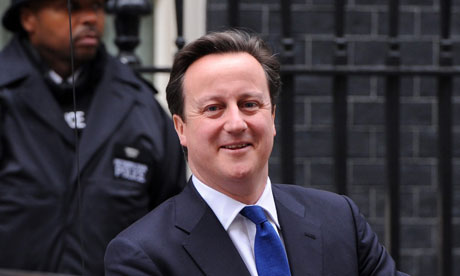Benefit cuts bite down on the poor and disabled as poll tax spectre reappears
Renters have to deal with bedroom tax, some disabled people totally lose benefits – but if you're a millionaire you'll be quids in

Although Cameron's benefit cuts will hit the poorest members of society hardest, the 5p top tax rate will save the wealthiest £40,000 annually. Photograph: Andy Rain/EPA
Unlucky for some is an understatement, at the dawn of financial new year 2013. The cuts are coming so thick and fast, that for many April will feel like a slap round the face with a cold fish.
Perhaps there are families out there who will be hit by all the welfare"reforms" at once, but I'd soon run out of fish if I tried to describe one, so let's concentrate on two groups …
First up, hard-up renters are about to discover that they really can't win.
Where their family is too big they face an arbitrary new benefit cap; where it is deemed too small for a council house they face the "bedroom tax". This supposedly targets "under-occupation" after children leave home, so – just to make sure that these families are screwed every which way – the government has ramped up charges that apply when grown-up kids return to the nest.
Oh, and even if such a family relents and moves, its will soon discover that housing benefit no longer rises in line with anything as material as rent. Instead, it will be pegged to the slower climb in the cost of shopping, before being squeezed down further next year.
The unhappy new year of disabled people is also worth wheeling into the spotlight. As Scope and Demos set out last week, many will be told they are no longer disabled during 2013/14. That sounds like it should be good news, but sadly we're not talking about the regrowth of lost limbs or any other medical miracle. Rather, Whitehall has done its sums, and decided that so far as the system is concerned there are simply going to have to be fewer disabled people from now on. On top of that, there are thousands whose condition is beyond argument, but who will nonetheless have their money stopped because they have had the cheek to be sick or disabled for too long.
All this will leave some frail folk needing emergency finance. The social fund piggy bank might have helped them, but it is being smashed this month, and so they will be left squabbling with cash-strapped councils about the cut-price local schemes drawn up in its place. And just as town halls are transformed into The Bank that Likes to Say No, cash-strapped people will suddenly face having to contribute towards town hall bills, thanks to the shredding of council tax benefit …
The list of great British administrative cock-ups is long indeed, but there is no argument about the number one spot. One sober academic analysis of the community charge is called Failure in British Government, and another called Fiscal Anarchy in the UK. Invoking its name puts any policy beyond the pale – household metering, for example, was called a poll tax on water, and rail privatisation a poll tax on wheels. A generation after the original catastrophe, the coalition is going one better and bringing us a poll tax in the original context of local government finance.
The council tax will continue to charge (slightly) more of waged people in large than small homes – it is only in respect of the poor that we are heading back to the 1980s. Exactly as then, town halls are suddenly going to be charged with pursuing poor people for a chunk – then, as now, around a fifth – of their local tax bill. Far more than the flat rate for dukes and dustmen, it was the impracticality of chasing so many people for modest amounts that unleashed "fiscal anarchy" last time. This time the chaos could be redoubled, because every council is writing its own rebate rules.
But perhaps it will all go swimmingly, in which case look out for other welfare state trouble spots. The great NHS overhaul goes live on Monday, and horror stories could emerge sooner rather than later if some GPs prove either incompetent or corrupt in handling the purse strings being thrust on them. Next, a few months down the line, the switch is flicked on Iain Duncan Smith's universal credit. With a new computer, new rules and a need to run old and new systems in parallel, the risks are plain. The government has been winning the moral argument about "scroungers" till now, but this could be the year that it finds itself mired in an argument about competence, which could prove harder to win.
I don't want to write a new year message of unremitting gloom. So let's remember that this week top tax is being trimmed by 5p in the pound, a change worth well over £40,000 annually – so long as you're earning a million. So amid the hunt for good news in 2013/14, it seems especially pressing to wish everybody a prosperous new year.

No comments:
Post a Comment